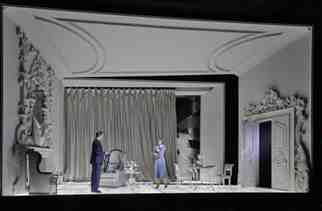|
Back
Vanessa’s Mysteries Haunt Santa Fe Santa Fe
Opera House
07/30/2016 - & August 3, 12, 18*, 24, 2016
Samuel Barber: Vanessa, opus 32
Virginia Verrez (Erika), Andrew Bogard (The Major-Domo), Erin Wall (Vanessa), Zach Borichevsky (Anatol), Helene Schneiderman (Baroness), James Morris (Doctor), Andrew Simpson (Footman)
Santa Fe Opera Orchestra, Leonard Slatkin (Conductor)
James Robinson (Director), Allen Moyer (Scenic Design), James Schuette (Costumes), Christopher Akerlind (Lighting), Sean Curran (Choreography)

Z. Borichevsky, V. Verrez (© Ken Howard/Santa Fe Opera)
Samuel Barber’s Vanessa is full of guilty pleasures. The first American opera to be premiered at the old Metropolitan Opera House, it was a huge hit on opening night. The production at the Santa Fe Opera Festival show us why.
Under the baton of Leonard Slatkin, the score suggests haunting mysteries. Particularly striking are the lush strings. Barber underlines the dark tale with oddly enchanting dissonance. Sometimes harsh sounds echo the pain on stage. Always Slatkin pushes the score to reflect the unfolding emotional life of the characters. While you do not sit on the edge of your seat awaiting outcomes, you squirm and often look for an out. The composer and librettist won’t let go of your anxiety.
An elegant surface is achieved in sets by Allen Moyer. Costumes by James Schuette rival those of Cecil Beaton in the original production. Secrets and lies swish in the folds of Vanessa’s dress. Erika, who may be Vanessa’s younger self or even her daughter, is simply dressed in tailored blue and then in virginal white as she goes off into a freezing night to abort a child.
Is Erika Vanessa twenty years ago? Does she make the same decision as Vanessa, based on lost love and an ambivalent pregnancy? Does Erika’s dilemma end the family’s repeated display of an original sin? Edgy horns are dissonant, suggesting how dark the choices in this tale are.
Barber’s score often suggests reflections. As the opera opens, mirrors and portraits are covered. The castle may be inspired by the Panoptikon in Copenhagen where mirrors reflect a subject from right and left. In the ceiling and on the floor a hundred glares catch the eye. Barber plays with the idea of likeness as reflected. We are mirrored by others, just as we may be their mirrors. Often drenched in harmonies and the textures of brass and strings, Barber has composed a tableau of three women who may be one.
Early on Menotti drops in a reading of Sophocles’ Oedipus. It is not skimmed over, but the urgency of Vanessa’s instructions to Erika on how to read the script makes us quickly forget its content. Here Erin Wall as Vanessa wraps her mouth around vowels and consonants, holding them long to show Erika how to display their passion. We forget the hint about one of the play’s themes, the repetition of incestuous patterns in a family.
It is intriguing to think that this opera might be a meditation on Barber and Menotti’s relationship. From the early days when they summered near Menotti’s family on Lake Como, and first visited Arturo Toscanini on his island on the lake, Barber and Menotti were a pair. Menotti would later write that Barber felt theirs should be an immortal friendship, but somehow it didn’t turn out that way.
The Baroness delivers a shocking slap to Erika when she is told that Erika’s pregnancy has been ended. Is this one of the many tortured moments in which love is thwarted?
The opera is full of great beauty and lyric passion. Often the tones are so intimate that we are self conscious listening to another’s heartbeat. Barber captures the emotional games people play in the name of love. These notes are not pretty to hear, yet they are arresting in Barber’s hands.
Arias like “Must the winter come so soon,” and “Do not utter a word,” are exquisite. The quintet in the last act is deeply haunting. Director Robinson never crowds the castle rooms, but instead gives space to disquiet.
At once sad and playful, Erin Wall brings a richly textured soprano to the role of Vanessa. Virginia Verrez sings Erika in a full mezzo. Her touch is light, suggesting the fragility of this character, her inexperience and her yearning.
We were treated to the opera stalwart James Morris in the role of the Doctor. Morris often speaks his notes, but his great good humor and caring as Doctor to this aristocratic family has just the right avuncular touch. Gothic noir in a perfect genre for the operatic form. Remembrance prompts covered reflections which are remembered again. Conductor Slatkin and director Robinson support the cast in creating an uncomfortable yet provocative and moving story. Vanessa is richly realized in Santa Fe.
Susan Hall
|